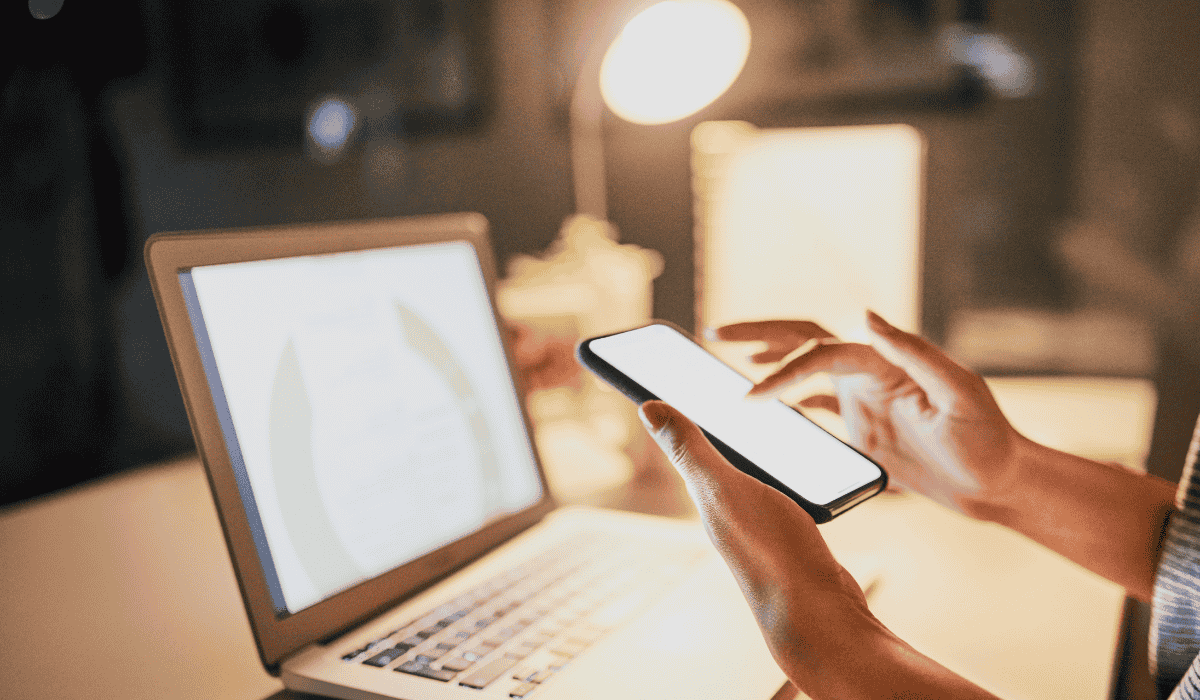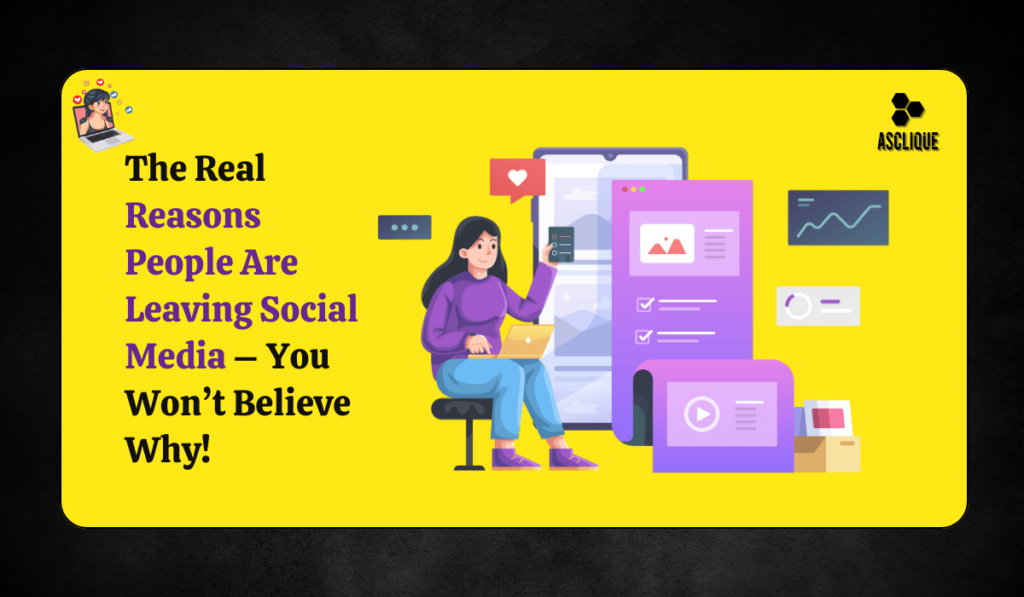Social media has become a defining agent in the direction of digital communication, relationships, and even enterprise. Facebook, Instagram, Twitter (now referred to as X), TikTok, and LinkedIn are some platforms that have altered the mannerisms of people around the globe. Yet, much as it’s been embraced everywhere, more people are opting out or even abandoning it altogether. This change brings about an important question: Why do more individuals elect not to identify on social media anymore?
The increasing lack of interest in staying online is being driven by a variety of individual, social, and psychological motivations. Whether in response to concerns about mental illness, privacy issues, or yearning for something real, the phenomenon of elimination or reduction of social media existence is on the rise.
Understanding the Shift Away from Social Media
Early in the 2000s, social media was a fun new means of communication with friends and family, offering a space to share views and keep abreast of events. But 2025 has transformed the online environment. Social media is no longer just a friendly social device, but has evolved into an economy of attention, where influencer culture, tracking data, and algorithms prevail.
Let’s consider the top reasons why individuals do not identify on social media:

Emotional and Mental Well-being
- Anxiety & Depression: Social media brings in stress, self-doubt, and melancholy from ongoing comparison with others.
- Social Validation Pressure: The pressure to garner approval by getting likes, shares, and comments can prove exhausting.
- Doomscrolling: Ongoing viewing of adverse news and web disputes can take its toll on mental health.
- Fear of Missing Out (FOMO): Observing others’ highlight reels makes users feel left behind or unhappy with their own lives.
Privacy and Security Issues
- Personal Data Tracking: Sites harvest user data for ads and analytics, leaving many uneasy.
- Cybersecurity Threats: Hacking, phishing, and identity theft are increasing dangers.
- AI Surveillance & Facial Recognition: Most social media sites monitor user activity and employ facial recognition technology.
- Data Breaches: Recent events such as the Cambridge Analytica scandal have left users suspicious of data abuse.
Digital Fatigue and Social Media Burnout
- Overconsumption of Content: The endless deluge of information is draining.
- Lack of Authenticity: The majority of users feel that social media interactions are superficial and lacking in actual connections.
- Algorithm Manipulation: Users feel they have no control over what they are shown, as social media businesses concentrate on engagement-driven content.
- Content Overload: Having to remain up-to-date with trends, news, and influencers is overwhelming.
Desire for More Meaningful Connections
- Shallow Interactions: The majority of users find online friendships do not count.
- Preference for Face-to-Face Communication: People are discovering substance in real relationships.
- Decreased Trust in Social Media Communication: Online communication does not have room for subtlety, thus leading to miscommunication.
Social Media’s Negative Influence on Self-Esteem
- Unrealistic Beauty Standards: Photo editing and filters give people unrealistic beauty ideals.
- False Perception of Success: Influencers have a life of luxury that they may not truly have, generating unrealistic expectations.
- Toxic Positivity: Social media only posts good experiences, making others feel less than.
Declining Engagement and Shifting User Habits
- Platform Saturation: With various social networks, individuals feel frustrated to keep track.
- Emergence of Private Communities: Most users opt for limited, controlled virtual communities such as WhatsApp groups or Discord communities.
- Declining Organic Reach: Businesses and individuals have a hard time being seen due to algorithm shifts towards paid ads.
Professional and Professional Development Reasons
- Social Media Distractions: It can lower productivity and concentration in the workplace.
- Brand or Reputation Risks: Sending something inappropriate will cause professional harm.
- Avoiding Digital Footprints: Others minimize online presence for fear of employer judgments.
Ethical and Political Issues
- Misinformation and Fake News: Most sites cannot fight off misinformation, thus generating skepticism.
- Political Polarization: Social networking is now used as a playing ground for politics, causing tensions and frustrations.
- Exploitation by Big Tech: Certain users boycott social media because they are against the way large tech firms make money out of personal data.
Preference for a Simpler Lifestyle
- Minimalism & Digital Detox: Certain individuals opt for fewer digital distractions and a simpler life.
- More Time for Hobbies & Personal Development: Going offline means more reading, exercise, and off-screen activities.
- Increased Appreciation for Offline Experiences: Most believe that going offline results in clearer minds and greater well-being.
Evolving Social Media Trends & Platform Fatigue
- Too Many Ads: Social media sites favor advertisements over substance.
- Decline in User Engagement: Most users find platforms repetitive and less interesting.
- Over-commercialization: What began as social sites are now dominated by brands, influencers, and businesses instead of actual personal connections.
Signs That You No Longer Identify with Social Media
If you’re not sure if you should back off from social media, ask yourself if you connect with these signals:
- You are more stressed or anxious after going on social media.
- You browse aimlessly and don’t pick up any genuine value.
- You post less often or no longer have the desire to share.
- You want greater privacy and fewer online spotlights.
- You’re more disconnected from reality and closer to digital living.
If you identify with these indicators, decreasing your social media use may be helpful.
Advantages of Stepping Away from Social Media
Individuals who have restricted or eliminated social media from their lives experience a number of advantages, such as:
Improved Mental and Emotional Well-being
- Less stress, anxiety, and comparison.
- Increased self-confidence and improved self-image.
Greater Productivity and Concentration
- Fewer distractions result in improved concentration.
- More time spent on personal development and hobbies.
Deeper Real-life Relationships
- More meaningful interactions with friends and family.
- Improved appreciation for face-to-face communication.
Increased Privacy and Autonomy
- Less exposure to data tracking and online dangers.
Rediscovering Interests and Hobbies
- Having more time to pursue interests like reading, exercising, and creative pursuits.
- Having less digital distraction, resulting in clearer thinking.
How to Disconnect from Social Media in a Healthy Way
If you’re thinking of quitting social media, these steps can guide you to do so gradually and effectively:
- Take a Digital Detox: Begin with brief pauses—such as a weekend or a week—prior to making a final decision.
- Limit Screen Time: Employ apps to monitor and cut back on social media time.
- Curate Your Feed: Unfollow accounts that do not deliver value or introduce negativity.
- Disable Notifications: Minimize distractions and take back control of your attention.
- Find Alternative Activities: Swap social media time for hobbies, exercise, or off-line socializing.
- Communicate with Loved Ones: Discuss your lower online profile with close friends and propose other methods of staying in touch.
- Consider Permanent Account Deletion: If social media no longer has a use, account deletions might be the solution.
Final Thoughts: Will Social Media Ever Be the Same Again?
Social media keeps changing. Some are opting out, but platforms can adjust to meet demands on privacy, mental health, and authenticity. Some future trends might be:
- Greater user influence on algorithms and content visibility.
- Shifts to smaller, closer-knit online communities.
- New platforms centered around privacy and authentic interaction.
For the meantime, the decision to no longer identify on social media is also personal. You can cut back or stop entirely, but it is that you reach a level of balance consistent with your mental well-being, privacy issues, and personal ethos that counts.
FAQ’s
Why are people opting not to identify on social media anymore?
Most people are leaving social media because of issues related to mental health, privacy, digital exhaustion, and wanting more physical real-life relationships. Growing pressure to engage, monitoring of information, and the constructed realities of virtual friendships are also pushing people away.
How does social media affect mental health?
Excessive usage of social media has also been linked to depression, anxiety, and low self-esteem. Feeling pressured to get likes, comments, and approval, and constant exposure to Photoshopped lives, can lead to stress and self-doubt.
What are the advantages of limiting the usage of social media?
Reducing use of social media can result in improved mental well-being, greater productivity, closer real-life connections, more privacy, and free time for other things like entertainment and personal enrichment. The majority of users indicate they feel less distracted and more present once they have logged off.
How do I taper my social media use?
You can start with short digital detoxes, limiting screen time, deactivating notifications, unfollowing unnecessary profiles, and taking part in other activities such as reading, physical exercise, or hanging out with friends in real life.
Is it advisable to abandon social media once and for all?
It’s a matter of personal choice and lifestyle. Some like to be low-key online, while others like to be totally disconnected. The most important thing is to use social media in a manner that is healthy for your mental and emotional health and not allow it to pressure you.

